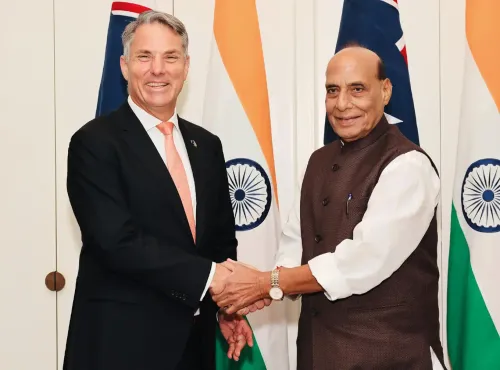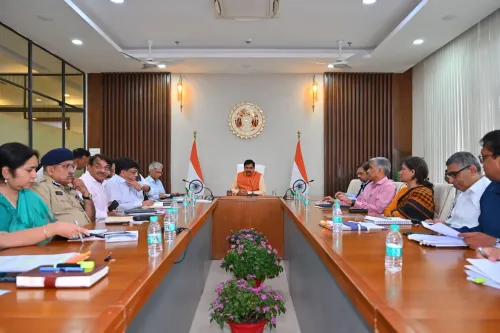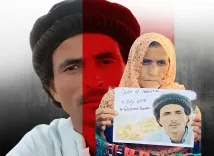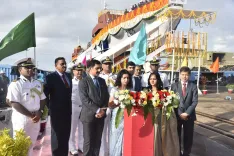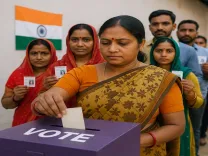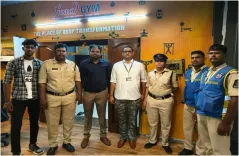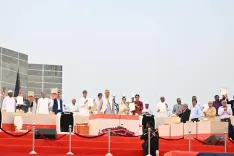Should Acharya Prashant's Call for an Awakened Vote Resonate in Bihar Elections 2025?
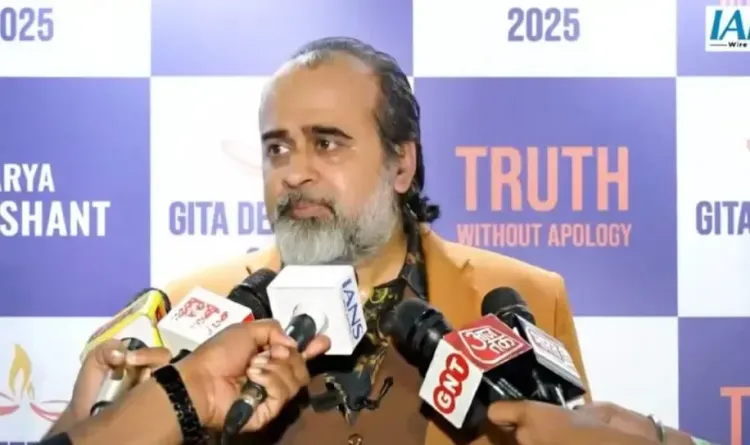
Synopsis
Key Takeaways
- Awareness is crucial for responsible voting.
- Education directly impacts social and economic conditions.
- The status of women reflects societal maturity.
- Voters should prioritize clarity over comfort in their choices.
- Heritage must be a living practice, not just a memory.
New Delhi, Oct 24 (NationPress) As Bihar approaches its elections, philosopher and author Acharya Prashant has urged the populace to perceive voting as a moment for awakening rather than a mere formality.
"The caliber of any government is never superior to the caliber of the populace that elects it," he stated. "When individuals cast their votes unconsciously, swayed by habit, caste, or anger, the electoral process reduces to a mere ritual. A dormant mind selects a lethargic system."
Acharya Prashant articulated that Bihar's plight extends beyond economic hardships to spiritual deprivation. "Bihar's tragedy is not solely its poverty; it is its unwillingness to awaken. Financial poverty can be remedied, but a lack of clarity is a deeper affliction."
He connected the state’s ongoing issues, including migration, unemployment, ineffective governance, and inadequate education, to a fundamental lack of awareness among voters. "Each statistic in every report reflects our collective consciousness. The wounds of Bihar are not just administrative; they stem from a lack of vision," he observed.
Referencing official statistics, he highlighted that Bihar's per-capita income is around Rs 54,000 annually, the lowest in India, with over 25 lakh individuals migrating each year in search of employment. The state's literacy rate hovers around 71% (with female literacy at approximately 61%), while female labor participation is a mere 25%.
"A region that once introduced the world to the Buddha now struggles to provide adequate classrooms for its youth," he lamented. "To rebuild Bihar means to reconstruct its classrooms. The greatest injustice to a human being is to keep them uneducated, for they remain unaware of their chains."
He emphasized that neglect in one domain adversely affects others. "The lack of focus on education results in unemployment; unemployment breeds disorder; and disorder ultimately extinguishes aspiration. When voters lack inner awareness, every sector mirrors this chaos in various forms."
He underscored persistent issues related to law and order, infrastructure, and healthcare. Bihar continues to experience one of the highest backlogs of court cases in India, and its power consumption per capita is less than a third of the national average. "Progress that does not reach the most marginalized is mere ornamentation," he remarked. "Without internal order, even external infrastructure collapses into misuse."
On the topic of unchecked population growth, Acharya Prashant cautioned that no economy can indefinitely outpace its demographics. Bihar's population density exceeds 1,200 people per square kilometer, which is three times the national average. "When population growth occurs without corresponding education, employment, or healthcare, every reform is rendered pointless," he stated. "Educating women and promoting family planning are not acts of charity; they are necessities for survival."
He asserted that the status of women serves as the truest measure of societal maturity. "The freedom of women is not merely a social concern; it reflects the core of a civilization. In households that revere goddesses, daughters remain confined for their safety."
Addressing electoral behavior, Acharya Prashant noted that the gravest corruption in Bihar resides not within government offices, but within the minds of its citizens. "Caste, handouts, anger, and emotions still dictate the choices made at the ballot box. The mind votes daily for comfort over clarity, for greed over gratitude; the EVM is merely the concluding act of that inner turmoil."
He encouraged voters to remain engaged and exercise discernment. "If no candidate appears worthy, the prudent course is not to seek perfection but to eliminate the undesirables, just as one would in an examination. Dismiss those who are evidently unfit, corrupt, violent, or divisive. From the remaining candidates, select the one who poses the least harm and retains a sense of conscience."
He also cautioned against being swayed by flattery. "Do not cast your vote for those who merely echo your desires. The leader who dares to share uncomfortable truths, even at the risk of their electoral prospects, is the one truly deserving of your support. The one who flatters prepares to exploit you."
Reflecting on Bihar's cultural legacy, Acharya Prashant stated that heritage must be practiced, not merely revered. "Bihar’s rich heritage—Buddha, Mahavira, Nalanda—is radiant. However, luminous memory is not synonymous with lived understanding. Knowledge is only transformative when it pierces through our falsehoods. Once it devolves into a mere inheritance, slogan, or tradition, it ceases to liberate and instead safeguards our vulnerabilities."
A living heritage, he asserted, must manifest in actions, integrity in public life, safety for women, educational institutions that foster genuine inquiry, and justice delivered through courts. "Otherwise, what we refer to as heritage is merely an excuse," he noted.
Acharya Prashant concluded by emphasizing that transformation in Bihar must originate from within. "Every external change is preceded by an internal one. If we do not first reform the voter within, the external system will persist in repeating its outdated patterns."
He called upon citizens to perceive the upcoming election as a responsibility rooted in awareness. "Bihar will ascend the day its citizens cease voting for mere satisfaction and begin voting for enlightenment. The true contest is not between political parties; it is between clarity and confusion, between light and darkness, between awakening and indifference."


